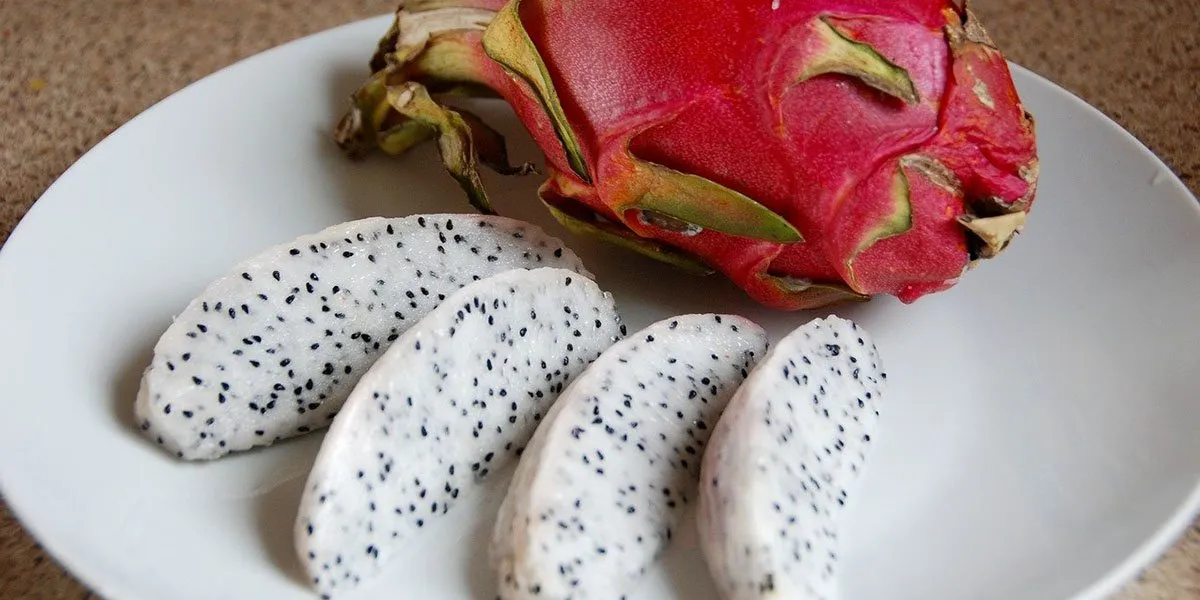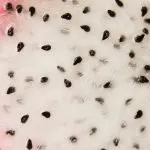Safe consumption of the dragon fruit (or pitahaya) is important. This overview will inform you of the potential dangers related to consuming this fruit. Luckily, the risks are very limited.
Dragon fruit is not poisonous. The flesh, skin, and seeds of the dragon fruit are all safe to eat. Incidentally, the skin can contain a negligible amount of poisonous pesticides. Wash the skin well before consumption.
Even babies and pets are allowed to eat the fruit. As with any type of food, it’s good to make sure the dragon fruit is eaten fresh. Brown color and change in consistency or smell can be an indicator of rot.
Dragon Fruit Is Not Poisonous (Mostly)
Pitahayas don’t naturally contain any harmful substances. Only the pesticides applied to the fruit might be considered ‘poison’. Pesticides might be found on the skin, but won’t be able to penetrate the edible flesh in any significant amount.
Dragon Fruit Skin
The hard, scale-like skin of the dragon fruit does not sound very appetizing. The savory skin is not commonly eaten raw, and it’s not used in juice or smoothies. However, it’s perfect for cooking, and is often used in cosmetics and food additives.
That being said, the skin is also the part of the fruit that is most likely to contain some amount of poison. It is not naturally occurring in the fruit, but is applied in the form of pesticides.
One Indonesian study found that only 0.006 mg per kg of pesticide residue was able to penetrate the dragon fruit skin. After a week, most of the pesticide dissipated quickly in the peel as well. The study noted that applying water to the skin will help remove pesticide residue.
Dragon Fruit Seeds
Since the peel of the dragon fruit functions as a protective layer, the flesh and seeds inside are safe from poisonous pesticides. The seeds don’t contain any harmful poison naturally, but also cannot be digested by the human body.
Any harmful substance that would be inside seeds is likely to be ‘pooped out’. But there are none.
Unlike other fruit seeds that can contain cyanide, the tiny black dragon fruit seeds don’t contain any poison. The seeds are safe to consume, and will even be good for you (due to their healthy fatty acids).
Reasons To Not Eat Dragon Fruit
While mostly void of dangerous poisons, there can be reasons to avoid eating the tropical treat. Here are some of the main reasons to not eat dragon fruit:
- Overconsumption of antioxidants: People who smoke should limit their intake of the antioxidant beta-carotene (a source of vitamin A), as it is known to contribute to a higher risk of lung cancer. Dragon fruits contain an average of 100 International Units (IU).
- A high amount of sugar: It cannot be denied that most fruits are healthy, but also contain a lot of sugar. Some people might want to limit their sugar intake. Dragon fruits will contain an average of 13 grams of sugar each.
- An allergy to dragon fruit: The immune system of some people might recognize the dragon fruit as a potentially harmful substance. This can trigger an allergic reaction, with acute consequences. These can include swelling of the tongue, hives, and vomiting.
- Laxative properties: While helpful against constipation, dragon fruit can be considered a natural laxative. This can influence your daily poop routine and cause you to be gassy.
Can You Get Sick From Dragon Fruit?
Daily consumption of dragon fruit will not make most people sick. However, people that experience an acute allergic reaction to dragon fruit should avoid it. Symptoms of a direct allergic reaction include:
- Swelling of the tongue
- Skin rash (hives)
- Vomiting
If you happen to be allergic to dragon fruit, these symptoms will start showing within 1 to 5 minutes. The condition is known as Oral Allergy Syndrome (OAS) and is extremely rare.
If you have OAS, it is unlikely that the syndrome shows itself for the first time while eating dragon fruit. In other words: it is extremely unlikely that a dragon fruit will make you sick. This is also true for vulnerable target demographics, such as infants.
How Safe Is Dragon Fruit For Babies?
Dragon fruit is safe to consume for babies. The edible flesh of the tropical fruit is a good resource of antioxidants, vitamin C, B, fiber, calcium, and carotene. These are all essential nutrients for a baby of 6 months and up.
Once babies are ready to start eating solid foods, a soft, juicy and natural fruit is a great start. However, because dragon fruits can irritate the stomach of infants and young kids, it is best to combine the fruit with more neutral foods.
If you’re unsure if your baby is ready to start eating dragon fruit, do make sure to consult your child’s pediatrician for individual professional advice.
How Safe Is Dragon Fruit For Dogs?
It is completely safe for a dog to eat a piece of dragon fruit, as long as the skin is thoroughly washed. Dragon fruit skin might contain trace amounts of pesticides or dirt, which can be easily removed with water.
To avoid the risk of suffocation or bowel movement problems, make sure to cut up the fruit first.
There is no difference between a yellow, red, or pink-colored variety. Dogs are allowed to eat some fruits as a snack, especially on a warm summer day. The dragon fruit is one of those safe-to-eat treats!



